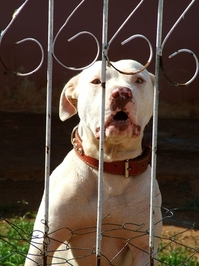In response to several highly-publicized dog attacks this year, including one that killed a 6-year old kindergartener as he walked to the bus stop, the Atlanta City Council voted to unanimously amend the city’s animal control measures related to dangerous or vicious dogs within the city. The amendment establishes the public safety and administrative procedures for the identification of dangerous and vicious dogs, the policy for subsequently registering dogs that are reported and determined to be dangerous or vicious, and imposes several statutory duties on the owners of such dogs. The Code of Ordinances for Atlanta can be found here.
The first major change relates to the definition of a “dangerous dog.” §18-115 previously defined a “dangerous dog” as “any dog that according to the records of any appropriate authority: (1) inflicts a severe injury on a human without provocation on public or private property; or (2) aggressively bites, attacks, or endangers the safety of humans without provocation after the dog has been classified as a potentially dangerous dog and after the owner has been notified of such classification.” Under the old ordinance, a dog was only defined as dangerous under the statute if the “appropriate authority” had record of the dog causing severe injury to a human or the dog had been previously designated as potentially dangerous, and the owner was aware of the designation. But, under the amended ordinance a dog is a “dangerous dog” if (1) its teeth cause a “substantial puncture” of a person’s skin without serious injury, (2) it aggressively attacks in a manner that causes a person to reasonably believe the dog posed an imminent threat of serious injury, even where no such injury occurs, or (3) while off the owner’s property, kills or seriously injures a pet animal.
By broadening the definition of a “dangerous” or “vicious” dog, the amendment reduces the burden on victims of dog attacks to establish the owner’s duty to the victim. In a negligence claim, the victim (plaintiff) must prove that the owner (defendant) owed a duty to the plaintiff, breached the duty owed, and the breach caused the plaintiff’s injuries. Under the negligence per se legal doctrine, a statute can establish a standard of conduct for breach of a duty where the victim is a member of the class the ordinance is designed to protect, and the injury caused by the owner’s conduct is the type of act the ordinance was meant to protect. Importantly, this doctrine creates a presumption that the owner owed a duty to the victim and breached that duty, which drastically increases a victim’s chances of recovering for her injuries. Moreover, because the amended ordinance designates a dog as dangerous if a person “reasonably believes” the dog poses an imminent threat of serious injury, a victim could establish a per se duty and breach of duty without the occurrence of any previous attack.
The amendment also modifies §18-171, and requires dog control officers to investigate whether a dog is subject to classification as a dangerous or vicious dog upon receiving a report that a dog is believed to be dangerous or vicious. After a dog is designated as dangerous or vicious by a control officer, the owner is entitled to a hearing to review the classification of the animal. (§18-171(b)) Then, if the hearing board classifies the animal as dangerous or vicious, the amended ordinance imposes a duty upon the owner to obtain an annual, non-transferable certificate of registration. The certificate of registration requires (1) written evidence that the animal has received a permanent microchip inserted by a licensed veterinarian; (2) an insurance policy or surety bond in the minimum amount of $50,000.00, insuring the owner of a dangerous animal, and $75,000.00, insuring the owner of a vicious animal; (3) tangible proof that the animal will be confined in a pen; and (4) written evidence that the animal has been sterilized by a licensed veterinarian. Finally, §18-173 imposes a duty upon owners of dangerous or vicious animals to (1) post signs warning that dangerous or vicious animals reside on the property; (2) muzzle and restrain the animal sufficient to prevent the biting of persons or animals and prevent escape whenever outside the pen; and (3) make the animal and area of confinement available for periodic, unannounced inspections by the animal control officer.
As discussed earlier, any failure to fulfill the four requirements of the certificate of registration, or properly secure the animal will give rise to a presumption of a breach of the duty owed to the victim, increasing the victim’s chances of recovering from the owner for their harms. While the broadening of the duty of dog owners is legally significant, the onerous certification and enclosure requirements in the amendment will also likely deter citizens from keeping potentially dangerous or vicious dogs and hopefully reduce the number of victims of such attacks.
I have successfully tried dog bite cases in Court and am available to speak to you about your dog bite case. With my experience, I would be glad to speak with you at your convenience.Please note that the Law Offices of Kevin C. Ford is currently accepting dog bite cases throughout Georgia. If you or a loved one has been injured as the result of a dog attack, then please contact me immediately, as time if of the essence and crucial information and evidence needs to be secured as soon as possible.
 Atlanta Personal Injury Lawyer Blog
Atlanta Personal Injury Lawyer Blog


